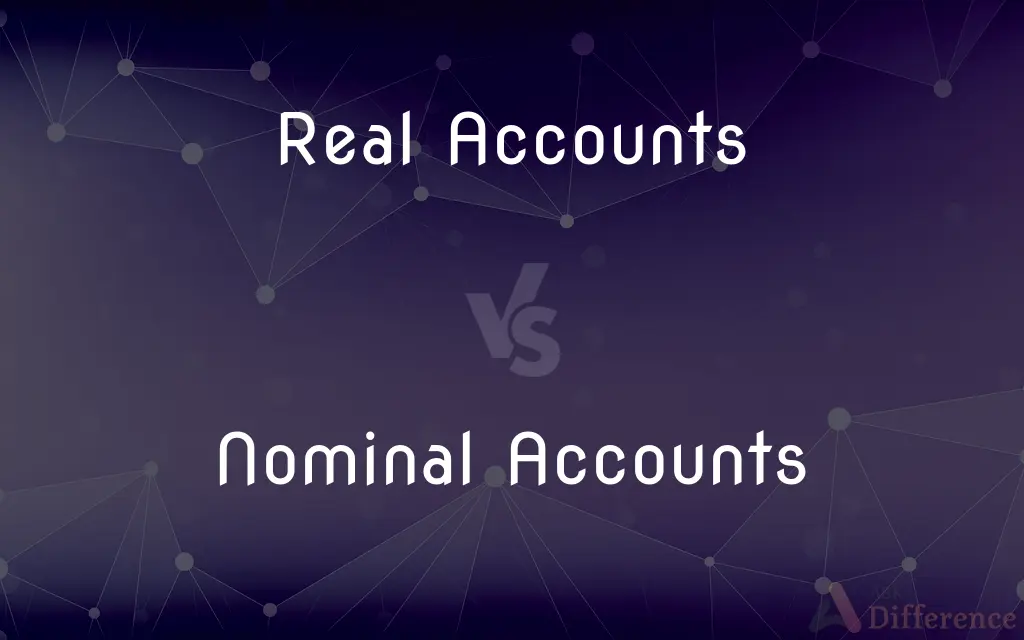Real Accounts vs. Nominal Accounts — What's the Difference?
By Tayyaba Rehman — Published on October 11, 2023
Real Accounts pertain to assets, liabilities, and equity; they are permanent and do not close at year-end. Nominal Accounts relate to revenue, expenses, gains, and losses; they are temporary and close at year-end.

Difference Between Real Accounts and Nominal Accounts
Table of Contents
ADVERTISEMENT
Key Differences
In the realm of accounting, distinguishing between Real and Nominal Accounts is indispensable for accurate and coherent financial statements. Real Accounts persist over multiple accounting periods, giving enduring information about the company’s financial position. Nominal Accounts offer transient information about the financial performance, necessitating closure and transfer to real accounts at the end of each accounting period to avoid misrepresentation of financial data.
Tayyaba Rehman
Oct 11, 2023
The differentiation between Real and Nominal Accounts is crucial for accurate financial reporting and analysis. Real Accounts provide insights into the financial stability and health of a company by representing assets, liabilities, and shareholder equity. They are balanced and maintained until the respective asset is disposed of or liability is settled. Nominal Accounts, on the other hand, measure the financial performance, depicting the company's earning and spending. They are reset to zero at the end of every accounting period to correctly reflect the income and expenses of the next period.
Tayyaba Rehman
Oct 11, 2023
Real Accounts are pivotal for balance sheet preparations, representing the value of assets, the amount of liabilities, and the equity of the owners. They reflect the company's economic resources and claims against those resources at a specific point in time. Conversely, Nominal Accounts are essential for preparing the income statement, illustrating the company’s profitability by summarizing revenues and expenses over an accounting period.
Tayyaba Rehman
Oct 11, 2023
Real Accounts and Nominal Accounts are fundamental classifications in accounting, serving distinct functions. Real Accounts represent the tangible and intangible assets, liabilities, and equity of a company. They have a lasting nature and do not close at the end of the accounting period. These accounts give a clear picture of the financial position of the company, allowing stakeholders to understand the company’s assets and liabilities. In contrast, Nominal Accounts are concerned with revenues, expenses, gains, and losses, capturing the company’s financial performance over a specific period. They are temporary accounts, closed and transferred to the capital account at the end of the accounting period.
Tayyaba Rehman
Oct 11, 2023
Comparison Chart
ADVERTISEMENT
Represents
Assets, Liabilities, and Equity
Revenue, Expenses, Gains, and Losses
Tayyaba Rehman
Oct 11, 2023
Usage
Provides insight into the financial position
Measures financial performance over a period
Tayyaba Rehman
Oct 11, 2023
Importance in Financial Statements
Reflected in the Balance Sheet
Reflected in the Income Statement
Tayyaba Rehman
Oct 11, 2023
Example
Building Account, Capital Account
Salary Expense Account, Sales Revenue Account
Tayyaba Rehman
Oct 11, 2023
Definitions
Real Accounts
Real Accounts are pivotal for balance sheet preparations.
Equity and Liability Accounts are Real Accounts that outline the company’s financial standing on the balance sheet.
Tayyaba Rehman
Sep 30, 2023
ADVERTISEMENT
Nominal Accounts
Nominal Accounts relate to revenues, expenses, gains, and losses.
The Sales Revenue Account and Rent Expense Account are Nominal Accounts.
Tayyaba Rehman
Sep 30, 2023
Real Accounts
Real Accounts are permanent and do not close at the end of the accounting period.
The Machinery Account, a Real Account, carries its balance to the next accounting period.
Tayyaba Rehman
Sep 30, 2023
Nominal Accounts
Nominal Accounts are temporary and close at the end of the accounting period.
The Salary Expense Account, a Nominal Account, is reset to zero at year-end.
Tayyaba Rehman
Sep 30, 2023
Real Accounts
Real Accounts provide a clear picture of the financial position of a company.
Assessing Real Accounts like the Land Account helps in understanding the company’s financial stability.
Tayyaba Rehman
Sep 30, 2023
Nominal Accounts
Nominal Accounts capture the company’s financial performance over a specific period.
Assessing the Income and Expense Accounts, which are Nominal Accounts, reveals the company’s profitability.
Tayyaba Rehman
Sep 30, 2023
Real Accounts
Real Accounts reflect economic resources and claims against those resources at a specific point in time.
The Cash Account, a Real Account, showcases the company's available resources.
Tayyaba Rehman
Sep 30, 2023
Nominal Accounts
Nominal Accounts are reset to zero to correctly reflect income and expenses of the next period.
The Interest Income Account, a Nominal Account, starts the new period with a zero balance.
Tayyaba Rehman
Sep 30, 2023
Real Accounts
Real Accounts represent assets, liabilities, and equity of a company.
The Building Account and Capital Account are types of Real Accounts.
Tayyaba Rehman
Sep 30, 2023
Nominal Accounts
Nominal Accounts are essential for preparing the income statement.
Revenue and Expense Accounts, being Nominal Accounts, summarize the company’s earnings and expenditures in the income statement.
Tayyaba Rehman
Sep 30, 2023
FAQs
What are Real Accounts?
Real Accounts are permanent accounts representing a company’s assets, liabilities, and equity.
Tayyaba Rehman
Oct 11, 2023
Are Nominal Accounts permanent?
No, Nominal Accounts are temporary and are closed at the end of each accounting period.
Tayyaba Rehman
Oct 11, 2023
Why are Real Accounts important?
Real Accounts are important as they provide insights into the financial position of a company by representing its assets, liabilities, and equity.
Tayyaba Rehman
Oct 11, 2023
Do Real Accounts close at the end of the accounting period?
No, Real Accounts are permanent and do not close at the end of the accounting period.
Tayyaba Rehman
Oct 11, 2023
What do Nominal Accounts represent?
Nominal Accounts represent the temporary accounts related to revenue, expenses, gains, and losses of a company.
Tayyaba Rehman
Oct 11, 2023
Where are Nominal Accounts reflected in financial statements?
Nominal Accounts are reflected in the Income Statement of a company.
Tayyaba Rehman
Oct 11, 2023
What is an example of a Real Account?
An example of a Real Account is the Building Account representing a tangible asset.
Tayyaba Rehman
Oct 11, 2023
How do Real Accounts appear in financial statements?
Real Accounts are reflected in the Balance Sheet of a company.
Tayyaba Rehman
Oct 11, 2023
Why are Nominal Accounts necessary?
Nominal Accounts are necessary for measuring the financial performance of a company by depicting its revenues, expenses, gains, and losses over a specific period.
Tayyaba Rehman
Oct 11, 2023
Can Real Accounts depict a company’s profitability?
No, Real Accounts mainly depict the financial position, not the profitability of a company.
Tayyaba Rehman
Oct 11, 2023
Do Real Accounts provide transient information?
No, Real Accounts provide enduring information about the company’s financial position.
Tayyaba Rehman
Oct 11, 2023
Are Real Accounts and Nominal Accounts mutually exclusive?
Yes, Real and Nominal Accounts are distinct; Real Accounts pertain to assets, liabilities, and equity, whereas Nominal Accounts pertain to revenues, expenses, gains, and losses.
Tayyaba Rehman
Oct 11, 2023
What is an example of a Nominal Account?
An example of a Nominal Account is the Salary Expense Account representing an expense.
Tayyaba Rehman
Oct 11, 2023
Can Nominal Accounts provide information about a company's assets and liabilities?
No, Nominal Accounts do not provide information about assets and liabilities but focus on income and expenses.
Tayyaba Rehman
Oct 11, 2023
Are Nominal Accounts reset to zero every accounting period?
Yes, Nominal Accounts are reset to zero at the end of every accounting period to avoid misrepresentation of financial data.
Tayyaba Rehman
Oct 11, 2023
Author Spotlight
Written by
Tayyaba RehmanTayyaba Rehman is a distinguished writer, currently serving as a primary contributor to askdifference.com. As a researcher in semantics and etymology, Tayyaba's passion for the complexity of languages and their distinctions has found a perfect home on the platform. Tayyaba delves into the intricacies of language, distinguishing between commonly confused words and phrases, thereby providing clarity for readers worldwide.

















































